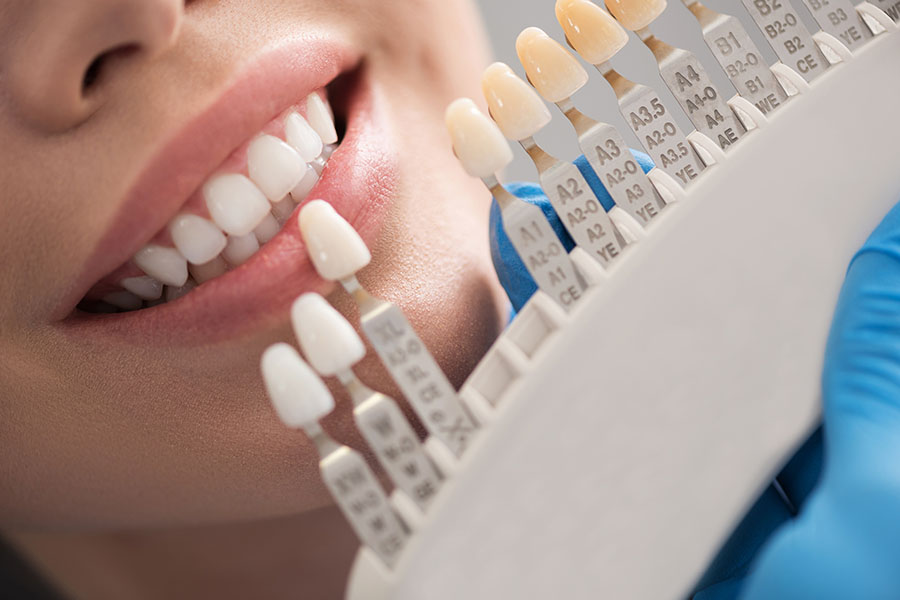It’s normal to want to know how long dental crowns last, especially if your teeth or fillings didn’t. There’s only so much embarrassment you can handle of coworkers and family staring at your smile.
Seeing chipped, damaged, or cracked teeth to their horror. Watching dentures fall out of your mouth when chewing or talking with disgust.
Dental crowns may be a more expensive tooth investment but are worth every penny. We’re going to explain their lifespan and how to maximize them so you can restore your pearly whites.
What are Dental Crowns?
As artificial teeth, dental crowns are “caps” that go over the top of your bad ones. A dental expert can install them on your back or front teeth above the gum line.
First, they’ll place a temporary crown over the compromised tooth and switch it for the permanent crown after they cement it.
They wear and feel like normal teeth, and nobody can tell the difference. Even when conversating or sharing a meal, they’ll match the rest of your mouth.
You can smile with less worry and self-consciousness in various ways with dental crowns:
- Stops weak teeth decay
- Hold dental bridges in pace
- Top off dental implants
- Cover yellowed or discolored teeth
- Restore worn-down/broken teeth pieces
Fillings are an excellent option when tooth damage isn’t too severe. However, it may decay or break far enough to where a dental professional will recommend spending extra for a more permanent solution.
How Long Do Dental Crowns Last?
Unlike veneers, the average lifespan for dental crowns is 25-30 years if you give them the proper care. Extending a crown’s lifespan could mean restoring natural teeth for the rest of your work career or retirement.
They’ll repair tooth decay and damaged teeth for 15 years, but only if you don’t keep up with daily hygiene practices. Keep in mind that root canals stay intact for 10 years and could necessitate a crown to replace them.
We suggest speaking with a dental professional to inquire about the lifespan of your specific crown. Each type of crown has its own shelf life, and a tooth expert can explain how long each one lasts.
How Do I Know When to Replace My Crown?
Dental crowns are durable tooth solutions since they’re made out of reliable materials, such as porcelain, metal, and gold. However, they can still break like bridges and are vulnerable to normal wear and tear.
You can experience decay underneath the damaged crown if you leave it inside the mouth. We recommend getting dental care and visiting your dentist as soon as possible for a new crown if you catch any of these signs.
| Chipped or cracked crown | Broken crowns do not completely cover the damaged tooth, leaving it vulnerable to future decay. |
| Crown falls out | Crown cement can fail, resulting in the artificial tooth falling out when you least expect it. |
| Allergic reaction | Some people are allergic to the different metals inside dental crowns. |
| Bitting down brings tooth sensitivity | You experience pain when biting down since the dentist fits the crown too high up on the tooth. |
How to Extend a Crown’s Lifespan?
Extending a crown’s lifespan means preserving the artificial tooth from cracking, chipping, or falling out.
For example, you don’t want to chew directly on hard candy, popcorn hulls, and ice, for example. They have a high chance of destroying the crown and putting thousands of dollars down the drain.
Another tip for making your dental crown last as long as possible is to keep up with oral health and dental practices. We treat your crown as any other tooth, which means it needs brushing, flossing, and regular cleanings.
Finally, you can purchase a stronger crown like a gold alloy crown to give a brilliant smile for longer. They are more resistant to various pressures, and the cementing is less likely to give way.
Are Dental Implants the Same Thing as Crowns?
While dental professionals attach crowns on top of an implant, they are not the same thing.
Dental implants are artificial tooth roots that a dentist installs in your jawbone. They drill into the cartilage, fill in the space with the metal implant, and wait 3-6 months for the void to heal.
In the end, they’ll attach a titanium abutment and a permanent crown to the implant to last you the rest of your life. Insurance companies do not usually cover implants, and they cost much more than a crown by itself.
But we’ve worked with many patients that have never bothered about their teeth again by getting an implant-crown combo done.
Smile for Longer and Less
Taking preventative dentistry measures with crowns saves thousands of dollars and heartache later. You’ll be glad you chose a dental crown to replace damaged or cracked teeth in your mouth.
Dr. Smith has helped many locals near Gilbert and Mesa restore their teeth with dental crowns. He’s a dental professional that advises you on services that protect compromised teeth and give you a smile to be proud of.
With gold crowns, ceramic crowns, and other types of crowns, Dr. Smith can recommend the best option for your teeth. He’ll consider your budget and how many crowns need to be replaced if you have broken ones.
If you want to reach out for an appointment, our team would be glad to help. Give us a call today at (480)-838-3033, so we can connect you to an expert on tooth restoration.

